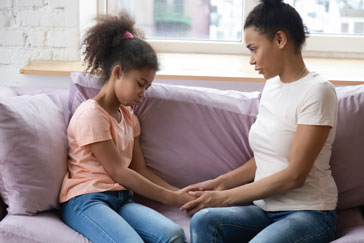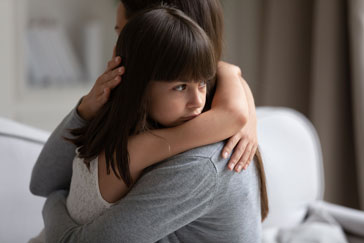Childline has had thousands of calls from worried kids during the pandemic. Lisa Salmon talks with experts to find out how to help youngsters cope.
The pandemic has been tough for everyone – and that includes our children. Since it started last spring, Childline has heard from thousands of children worried about their own mental health and wellbeing, and feeling lonely.
It’s not hard to understand why – the change in daily routines, being isolated at home without seeing wider family and friends, and the removal of normal support networks outside the home has led to anxiety in young people – particularly those who were already trying to cope with other issues.
Childline counsellor Neil Homer says: “Last year was hugely testing and the challenges posed by the pandemic caused major disruption for many young people. Thousands reached out to Childline – sharing that they felt lonely and were struggling with their mental health, and telling us they felt isolated and scared.”
And Emma Thomas, chief executive of the children and young people’s mental health charity YoungMinds, says: “Sadly, the concerns Childline are hearing from children echo what young people have been telling us – they’ve struggled to cope with the changes and loss of coping mechanisms brought on by the pandemic, with many experiencing social isolation, anxiety, and fears around their future.
“The pandemic is deepening the crisis in young people’s mental health and there’s growing evidence suggesting the impact could be significant and long-term. Many lost access to mental health support during the first lockdown, while others chose not to look for help when the NHS was under so much pressure. With another lockdown, it’s likely more young people may struggle to cope.”
Here, Childline and YoungMinds outline how to help support children’s mental health and prevent feelings of isolation…

1. Know how to spot the signs
You can’t help your child if you haven’t realised they’ve got a problem, and Young Minds says there are many things to look out for. “If you notice your child is becoming withdrawn, that there’s been a change in sleeping or eating habits, if they seem to lack confidence or get upset, it might be a sign they’re struggling,” warns Thomas.
2. Talk to your child
If you spot signs your child might be struggling, it’s important to talk to them.“Keep talking and trying to communicate in any way you can – hugging, listening to them, texting them,” advises Thomas.
3. Expressing feelings doesn’t have to be face-to-face
Children might find it easier writing their thoughts down, so the whole family could do this and put them in a ‘feelings box’ and then talk about their good, sad or difficult feelings at the end of the day. For younger children, play can be a great way to help them talk about their worries or give them a good distraction when they’re upset, says Homer.
“An environment where children can share their feelings not only helps them manage their own wellbeing but also means they’re more likely to share when something’s really troubling them,” he points out. “Sudden changes in behaviour can be an indication something’s wrong, so take the time to listen and encourage them to think about the next steps they want to take.”
4. Create structure and routine
For many families, keeping a normal routine during the pandemic has been difficult, particularly during periods of home schooling. “It’s normal for a lack of structure to make children and young people feel anxious and upset,” explains Homer.
“Try introducing a rota or loose timetable that includes fun things you’re doing during the week. Structure can help children see what’s happening next in the day, look forward to the rest of the week and differentiate between weekdays and weekends. It also helps to create a feeling of stability, which can alleviate anxiety.”

5. Give children a sense of control through information
Uncertainty about the future can be stressful, but knowing we don’t always have all the answers is reassuring too, says Homer, who points out that online information tools can help children work through their worries.
He suggests parents look online with their children to find useful information and resources that help children feel they have control. Childline has advice on coronavirus on its website, and lots of tools to help alleviate anxiety.
6. Help your child manage stress
If children’s worries become unmanageable or feel out of control, they can lead to mental health difficulties or feelings of isolation. But before attempting to fix the problem, Childline advises parents to listen to what’s concerning their child and ask how they might like to tackle the problem.
“Unlike adults, children are unlikely to have coping strategies and helpful ways to manage stressful feelings, so as adults it’s important we guide and support them to do this,” says Homer. “Let them know difficult things are going to happen which can cause us to feel like we can’t cope and that’s OK, and it’s how we manage these feelings and move forwards that’s important.”
He says carving out time to relax is a great way to deal with stress, and outdoor physical activity can really help as well.
7. Limit screen time and mix up activities
As most socialising moves online, it’s important to have conversations on how an increase in screen-time can have an impact on everyone’s mental health and self-esteem, says Homer. Many young people on social media compare what they have or look like to their peers or celebrities, which has a negative impact on self-esteem and self-confidence.
“Remind them nobody’s perfect and we’re all different, special and unique in our own way,” advises Homer. “While the online world provides a great way to connect with friends and family, it’s important young people also engage in off-screen activities. This can increase a feeling of connection with others, which can help to limit isolation and loneliness.”
8. Help and support for parents & children
If things don’t improve, seek help, whether that’s through your child’s school, your GP or via a helpline like Childline on 0800 1111 or the YoungMinds helpline on 0808 802 5544.
If adults are worried about children they can get advice from NSPCC practitioners on 0808 800 5000 or [email protected]. There’s advice on the YoungMinds (youngminds.org.uk) or Childline (childline.org.uk) websites, or children can have a 1-2-1 chat on the Childline site, use its message boards, or visit its Calm Zone (childline.org.uk/toolbox/calm-zone).
The NSPCC (nspcc.org.uk), which runs Childline, needs more volunteers to both help with its services like Childline, or take on a fundraising challenge. Find out more here nspcc.org.uk/support-us/events-fundraising/new-year-challenge .
For help with drug or alcohol addiction, a specialist help could be found at Rehab Recovery.






